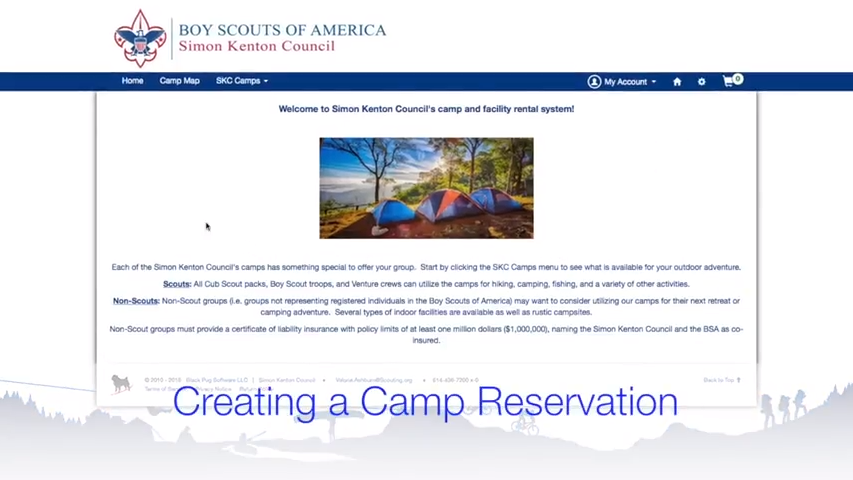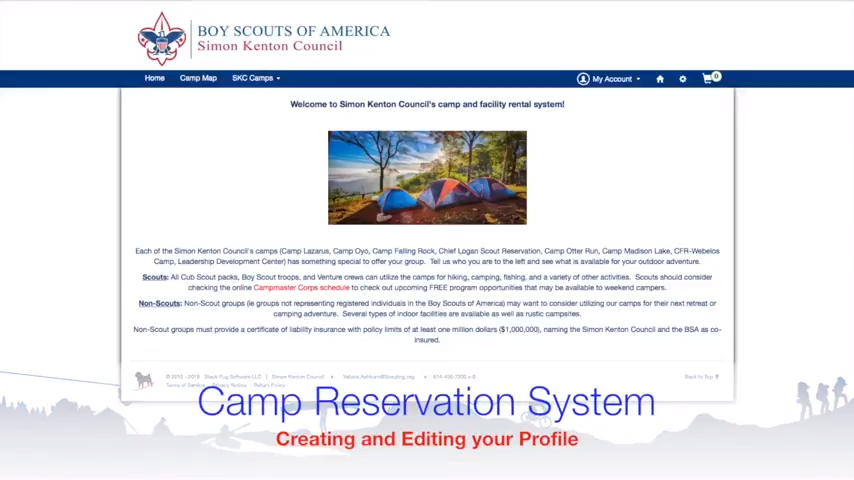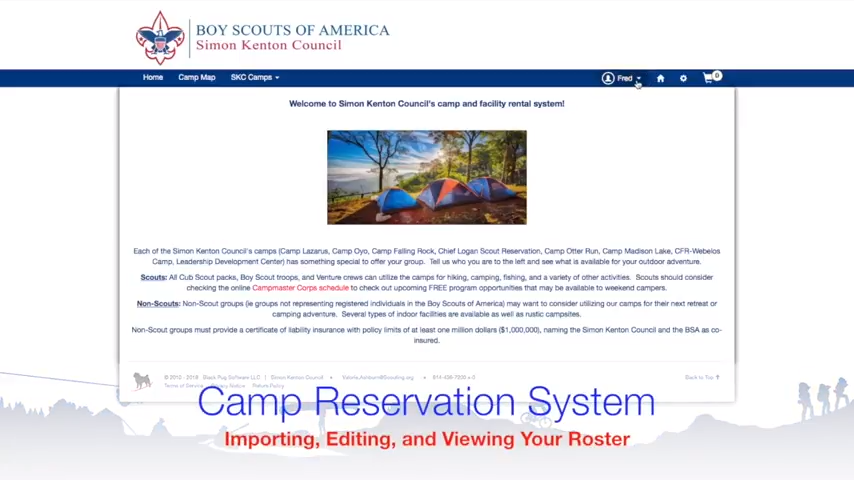Cherokee Campsite is set up with tent platforms. Its capacity is 26.
Tents are available for a fee upon request.
Night
06:00 PM
11:00 AM
| 30 | Capacity |
RESERVATIONS
Reservations must be made through the Council Service Center only. No reservations will be made at Camp Mountain Run. Your reservation will only be booked after money is received. You will receive a confirmation email and your receipt once the reservation is booked. A schedule of fees is attached for each item.
Cancellations will be accepted with 30 days’ notice and approved refunds will be credited toward the next reservation. Cancellations with less than 30 days’ notice will not be refunded unless another unit can be found to replace your unit.
CHECK-IN TIMES & PROCEDURES
You must check into camp at Hallstrom Administration Building with the Camp Ranger or Camp Master before going to your cabin. Check-in time is Friday AFTER 6:00 P.M. Early check-in is available with advance notice (3 business days.) You must have at least a 21-year old and a second adult at least 18-years old present at check-in time. Checkout should be before 11:00 a.m. Sunday.
Upon check in the Campmaster or Ranger will distribute a courtesy bucket with a working smoke detector that is to be placed in the cabin during your stay. Upon checkout, the bucket is to be returned to the camp master or Ranger with a working smoke detector.
A roster should be turned into the Campmaster at check-in. The Scoutmaster must have a copy of the unit roster.
You must be checked in and out of your cabin. All damages must be paid for prior to your Unit check out, should any result during your stay.
PARKING
All vehicles are to be parked in our main parking lot ONLY. You can drop off equipment into a campsite using one vehicle, but the vehicle must be returned to the parking lot afterwards. Vehicles are not permitted to cross the stream to the Ah’Tic Cabin, unless extenuating circumstances exist and prior arrangements are agreed to. Vehicles will be towed at owner’s expense. DO NOT block access road to woodshed or stream crossing.
CABIN RULES
Use of axes and wood splitting is to be done in Troop established area NOT inside the Cabins.
All ashes from Fireplaces and/or Wood burners are to be placed in ash barrels located at each Cabin.
All garbage is to be placed in garbage bags and disposed of in the dumpsters located near the Ryan Family Maintenance Facility.
Propane in each Cabin is for cooking ONLY, not heating.
No gambling is allowed.
NO SMOKING or TOBACCO use in the cabin or around the youth attending the facilities.
Smoke Alarm and/or Carbon Monoxide detector batteries are NOT to be removed.
Please Do NOT move the bunks within the cabins, even if your intent is to move them back! It could loosen the structure and damage the bunks as well as cause damage to the Floors.
PROGRAM EQUIPMENT
The camp has a limited supply of cook kits, axes, files, compasses, sharpening stones, water containers, cooking grills and other miscellaneous camping equipment that can be used during your weekend campout. Please arrange for equipment needs prior to your arrival at Camp when possible. All borrowed items will be returned in clean and good condition.
There is no rental fee. However, equipment that is damaged or destroyed must be replaced at cost by the renter.
CABIN CHECK-OUT before Contacting Campmaster
FLOORS ARE SWEPT INCLUDING UNDER the BUNKS
FLOORS ARE MOPPED INCLUDING UNDER BUNKS
APPLIANCES HAVE BEEN CLEANED
FIREPLACES/WOODBURNERS HAVE BEEN CLEANED (ashes should be placed within the barrel outside)
CABINET DOORS ARE OPENED (if applicable, this is to help keep mice from nesting)
BE SURE TO LEAVE NOTHING BEHIND (Especially paper products this will also help keep mice from nesting)
FIREWOOD HAS BEEN RESTOCKED TO CAPACITY ( Ah’Tic lake cabin is the exception due to its location)
BE SURE TO REPORT ANY MAINTENANCE CONCERN TO THE CAMPMASTER SO A WORK ORDER CAN BE FILLED OUT
LEADERSHIP The Sweet Sixteen of BSA Safety
Few youth organizations encompass the breadth, volume, and diversity of physical activity common to Scouting, and none enjoys a better safety record. The key to maintaining and improving this exemplary record is the conscientious and trained adult leader who is attentive to safety concerns. As an aid in the continuing effort to protect participants in Scouting activities, the Health and Safety Team of the BSA National Council has developed the "Sweet Sixteen" of BSA safety procedures for physical activity. These 16 points, which embody good judgment and common sense, are applicable to all activities.
1. QUALIFIED SUPERVISION Every BSA activity should be supervised by a conscientious adult who understands and knowingly accepts responsibility for the well-being and safety of the children and youth in his or her care. The supervisor should be sufficiently trained, experienced, and skilled in the activity to be confident of his/her ability to lead and to teach the necessary skills and to respond effectively in the event of an emergency. Field knowledge of all applicable BSA standards and a commitment to implement and follow BSA policies and procedures are essential parts of the supervisor's qualifications.
2. PHYSICAL FITNESS For youth participants in any potentially strenuous activity, the supervisor should receive a complete health history from a health-care professional, parent, or guardian. Adult participants and youth involved in higher-risk activity (e.g., scuba) may require professional evaluation in addition to the health history. The supervisor should adjust all supervision, discipline, and protection to anticipate potential risks associated with individual health conditions. Neither youth nor adults should participate in activity for which they are unfit. To do so would place both the individual and others at risk.
3. BUDDY SYSTEM The long history of the "buddy system" in Scouting has shown that it is always best to have at least one other person with you and aware at all times as to your circumstances and what you are doing in any outdoor or strenuous activity.
4. SAFE AREA OR COURSE A key part of the supervisor's responsibility is to know the area or course for the activity and to determine that it is well-suited and free of hazards.
5. EQUIPMENT SELECTION AND MAINTENANCE Most activity requires some specialized equipment. The equipment should be selected to suit the participant and the activity and to include appropriate safety and program features. The supervisor should also check equipment to determine that it is in good condition for the activity and is properly maintained while in use.
6. PERSONAL SAFETY EQUIPMENT The supervisor must ensure that every participant has and uses the appropriate personal safety equipment. For example, activity afloat requires a PFD properly worn by each participant; bikers, horseback riders, and whitewater kayakers need helmets for certain activities; skaters may need protective gear; and all need to be dressed for warmth and utility depending on the circumstances.
7. SAFETY PROCEDURES AND POLICIES For most activities there are commonsense procedures and standards that can greatly reduce the risk. These should be known and appreciated by all participants, and the supervisor must ensure compliance.
8. SKILL LEVEL LIMITS There is a minimum skill level requirement for every activity, and the supervisor must identify and recognize this minimum skill level and be sure that none is put at risk by attempting activity beyond the individual’s ability. A good example of skill levels in Scouting is the venerable "swim test" that defines conditions for safe swimming based on individual ability.
9. WEATHER CHECK The risk factors in many outdoor activities vary substantially with weather conditions. These variables and the appropriate response should be understood and anticipated.
10. PLANNING Safe activity follows a plan that has been conscientiously developed by the experienced supervisor or other competent source. Good planning minimizes risks and also anticipates contingencies that may require emergency response or a change of plan.
11. COMMUNICATIONS The supervisor needs to be able to communicate effectively with participants as needed during the activity. Emergency communications also need to be considered in advance for any foreseeable contingencies.
12. PERMIT AND NOTICES BSA tour plans, council office registration, government or landowner authorization, and any similar formalities are the supervisor's responsibility when such are required. Appropriate notification should be directed to parents, enforcement authorities, landowners, and others as needed, before and after the activity.
13. FIRST-AID RESOURCES The supervisor should determine what first-aid supplies to include among the activity equipment. The level of first-aid training and skill appropriate for the activity should also be considered. An extended trek over remote terrain obviously may require more first-aid resources and capabilities than an afternoon activity in the local community. Whatever is determined to be needed should be available.
14. APPLICABLE LAWS BSA safety policies generally parallel or go beyond legal mandates, but the supervisor should confirm and ensure compliance with all applicable regulations or statutes.
15. CPR RESOURCE Any strenuous activity or remote trek could present a cardiac emergency. Aquatic programs may involve cardiopulmonary emergencies. The BSA strongly recommends that a CPR-trained person (preferably an adult) be part of the leadership for any BSA program. Such a resource should be available for strenuous outdoor activity.
16. DISCIPLINE No supervisor is effective if he or she cannot control the activity and the individual participants. Youths must respect their leader and follow his or her direction. In addition to these general rules, safety concerns in certain BSA activities, including most of the aquatics programs, have been specifically addressed in more detailed guidelines. All leaders should review and comply with such guidelines in the respective activities.
WE AGREE TO ABIDE BY THE FOLLOWING REGULATIONS:
- Two adult leaders, one at least 21 years old, the other not less than 18 years old, will be with the unit at all times for BSA or other youth groups
- One 21-year old for every 10 members of party for other adult groups.
- Check in with Camp Ranger or Campmaster upon arrival.
- A current roster of all attending will be submitted to the Camp Ranger or Campmaster at arrival and updated as necessary.
- 6:00 pm check in unless prior arrangements are made with the ranger.
- Check out with Camp Ranger or Campmaster before departure by 11:00 am.
- Buildings and grounds will be kept clean and neat.
- Any damage and/or destruction will be paid for at departure. Restitution arrangements will be made prior to leaving the Camp.
- No liquid fuels or pressurized gas within cabins. This regulation does not prohibit the proper use of propane stoves or lanterns.
- No alcoholic beverages or controlled substances (drugs) are allowed on camp property.
- No gambling permitted on the Bucktail Council property.
- No firearms or fireworks on property
- Health and safety regulations do not permit pets in camp unless prior approval is obtained by the Campmaster or Ranger. All approved pets must be leashed. Service dogs are permitted.
- The Ranger/Campmaster must be notified immediately of any accidents or injuries to campers or damage to property, and a written report completed.
- Fires must only be in fire circles established by Camp Ranger and attended at all times.
- The Maintenance area and Camp Ranger’s yard are off limits.
- Vehicles are NOT permitted off the roadways. All vehicles must be in provided and marked parking areas. Vehicles will be towed at owner’s expense.
- No cutting of standing trees without permission from Camp Range
- No use of Tobacco around the youth or in the cabins.
- No moving bunks or equipment.
- CURFEW is 11:00pm for all campers in cabins and campsites. No youth is to be out of the designated cabin or campsite area after that time. Prior notification to the Campmaster is necessary when campers are outside for merit badge activities and purposes.
- All Scouts and Scouters will observe the buddy system and 2 deep leadership at all times.
- Scouts are to observe safe scouting laws and procedures and avoid disruption, disturbance or intrusion upon other units utilizing the camp.
- Ashes removed to barrels.
- Nothing left behind.
- Garbage placed in dumpsters.
- Wood bin stocked to capacity.
- Floors swept and mopped.
- Courtesy bucket retuned to Campmaster.
- If cabin is not clean and wood is not stacked, a maintenance fee of $50.00 will be charged to your unit.
Check-in is done at the Martha and A.B. Hallstrom Lodge located on the left side past the entrance gate. Park in the parking lot and come to the 2nd building on the left past the aluminum gate.
You must be checked out at the campsite or cabin before leaving camp. Schedule a time to check out with the Campmaster on duty (Hallstrom Lodge). The campsite will be inspected by the Camp Master or Camp Ranger in your presence. The Campmaster or Ranger will submit the check-out report to the Service Center upon completion of the weekend.
Cancellation Policy - full refund of deposit and total fee if canceled within 30 days of date of event. Cancellation with less than 30 days until event will result in forfeiting total fee. For Non-Scouting units, the deposit of $100 will be refunded.
The renter agrees that it shall be responsible for any and all damages to and cleaning of the Camp Mountain Run facility, which may reasonably be attributed to its or its participant's use of the facilities. The renter further promises that the facilities will be in the same condition at the conclusion of its, use as they were at the beginning.
In the event that damaged items must be repaired and/or replaced, or if clean up is necessary, renter authorizes Bucktail Council to select an individual or entity of its choice upon terms which Bucktail Council finds acceptable to perform the necessary repairs, replacement or clean up. Bucktail Council shall then bill Licensee for these expenses, and renter shall pay this bill within 10 days of its mailing by the Bucktail Council. For Non-Scouting units, the $100 will not be refunded and additional charges will apply should damages and cleanup exceed the deposit value.








